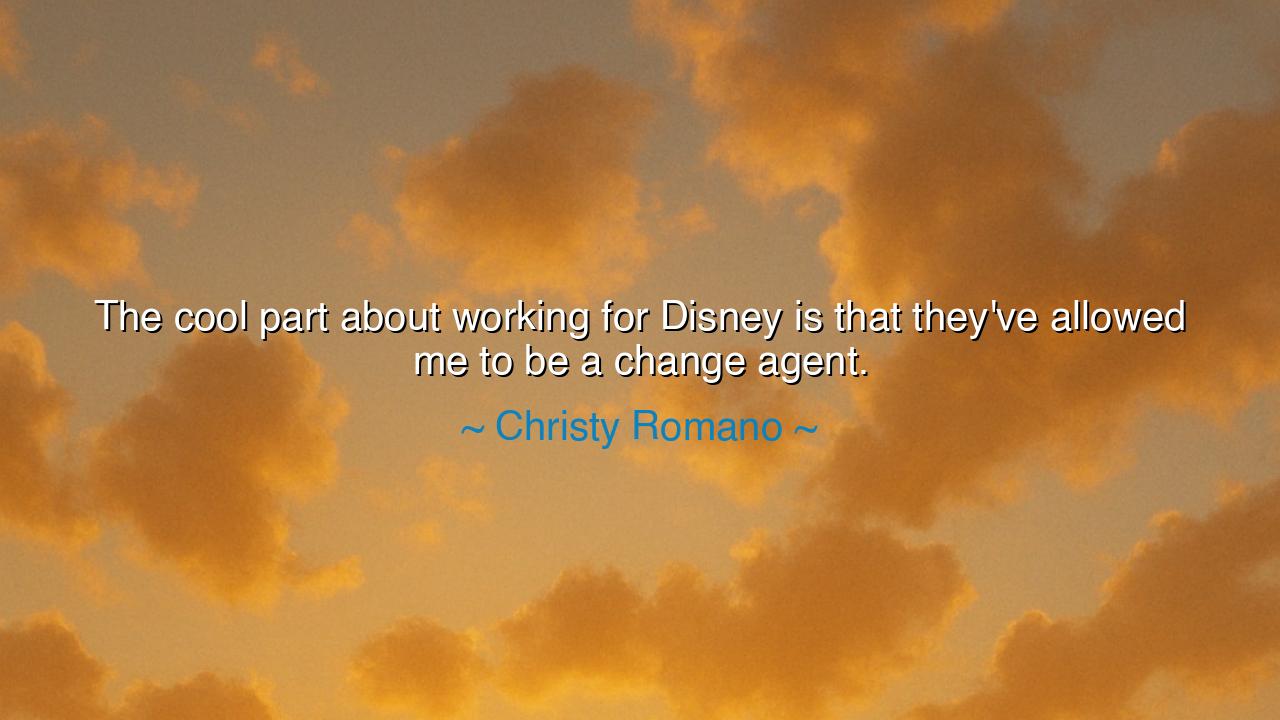
The cool part about working for Disney is that they've allowed me
The cool part about working for Disney is that they've allowed me to be a change agent.






In the ancient world, great thinkers and leaders were often those who dared to challenge the status quo and bring about change—individuals who possessed the vision to transform their world, to inspire others, and to leave a lasting legacy. Christy Romano, in her reflection, speaks to this timeless concept: "The cool part about working for Disney is that they've allowed me to be a change agent." These words hold within them a profound recognition of the power of empowerment—when organizations, institutions, or even societies grant individuals the freedom and trust to be agents of transformation, they set in motion the possibility of true progress.
The ancients understood that the most transformative individuals were often those who were not afraid to stand apart from the crowd. Socrates, the great philosopher, was famously labeled a gadfly by his fellow Athenians because of his relentless pursuit of truth and change. Socrates was not content to simply accept the way things were; he sought to challenge existing beliefs and institutions, encouraging others to question, to think critically, and to change. This spirit of being a change agent—someone who doesn’t just conform but seeks to reshape and redefine the world—is the very essence of Romano’s sentiment. In her words, we see a modern-day reflection of this ancient idea: that true progress comes from empowering individuals to challenge the established order.
In ancient Rome, leaders like Cicero also recognized the importance of change and reform. Cicero, a statesman and philosopher, spent much of his life advocating for the protection of the Republic and the restoration of moral integrity within the Roman Senate. His oratory and his insistence on the upholding of principles in a time of widespread corruption reflect his role as a change agent within the Roman political sphere. He was not merely a participant in the system, but someone who sought to transform it for the better, standing up for what was right, even when it was unpopular. Similarly, Romano’s role at Disney echoes this timeless call to reshape and improve the world through her actions, with the freedom to do so.
History is full of examples where change agents have reshaped societies, often at great personal cost. Take, for instance, Joan of Arc, who rose from humble beginnings to lead an army and challenge the French monarchy’s oppression during the Hundred Years' War. Joan’s leadership and vision brought change to a war-torn country, and though she faced enormous personal sacrifice, her actions redefined the future of her nation. Like Romano, Joan was granted the freedom to act and lead in a transformative way. Her story, like Romano’s, underscores the idea that being allowed to act as a change agent can lead to profound and lasting impact on the world.
In more recent history, the civil rights movement in the United States offers another powerful example of individuals stepping forward as agents of change. Martin Luther King Jr., who led with conviction and moral clarity, transformed American society by challenging the entrenched system of racial inequality. His nonviolent resistance and his belief in the power of love and justice made him a change agent of the highest order. His success was rooted in his ability to work within an institutional framework, but also to transcend it, using his voice to redefine what was possible. Just as Romano speaks to the opportunity to bring about change within a major organization, King’s example shows how individuals can catalyze sweeping social change by being given the platform and freedom to lead.
The lesson from Romano’s words and these historical examples is clear: true change requires more than just a willingness to innovate—it requires a system or institution that will empower individuals to act as agents of transformation. Whether in politics, the arts, or social movements, the ability to challenge the established order, to break through convention, and to create something new is what drives progress. This is not just about being rebellious for the sake of rebellion, but about recognizing that the world is constantly evolving, and it is those who are given the freedom to challenge the status quo who can truly shape the future.
In practical terms, we must strive to empower those around us—whether in our careers, communities, or in larger societal structures—to become change agents. We should encourage those with vision and creativity to lead, to challenge the conventions that limit growth, and to provide them with the freedom to innovate. Just as Disney allowed Christy Romano to shape her role and her contributions, we too must foster environments where individuals are free to take bold action, to question, to improve, and to redefine what is possible. By doing so, we can contribute to the ongoing evolution of our society and ensure that each of us plays our part in transforming the world for the better.
As we move forward, let us remember that change is not something that happens on its own. It is created by those who are willing to challenge the familiar, to embrace creativity, and to lead with vision. Just as the ancients and the great leaders of history understood, we too must empower the voices that seek to transform the world, to ensure that the future is not shaped by those who cling to the past, but by those who are willing to imagine and create a better tomorrow. Let us, like Romano, embrace the role of the change agent, recognizing the great responsibility and potential that comes with this power.






AAdministratorAdministrator
Welcome, honored guests. Please leave a comment, we will respond soon